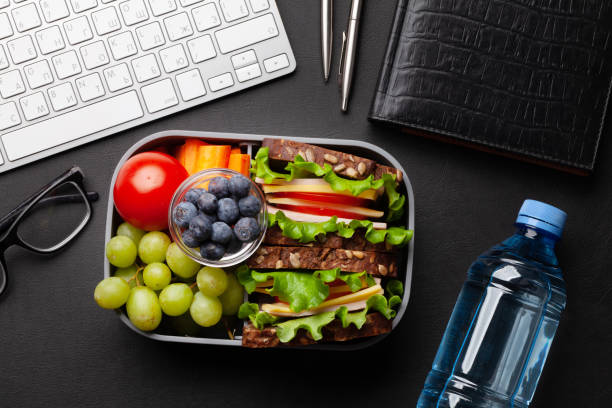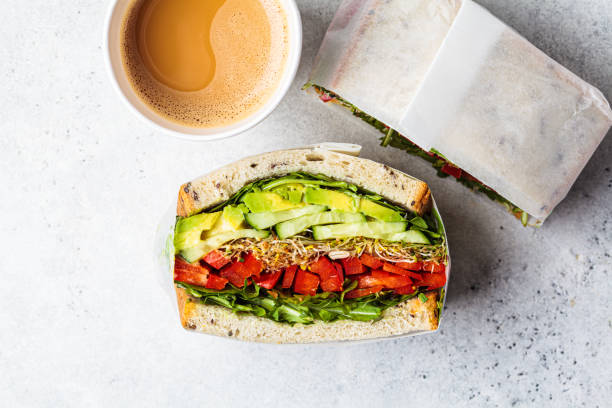Getting To Your Weight Loss Goal Can Happen

Are you looking to shed those extra pounds and achieve your weight loss goals? Your diet can greatly impact your weight, energy, and even teeth. Don’t believe me? Ask a dentist!
One area that often gets overlooked is the lunch box. By packing a nutritious and calorie-controlled lunch, you can stay on track with your weight loss journey. Let’s explore effective strategies and tips on how to pack a lunch box for individuals with specific weight loss goals. Proper planning and mindful choices allow you to enjoy a delicious and satisfying lunch while staying within your calorie limits.
Meals Are Important
We need first to address the issue that many have with skipping meals. Skipping lunch or adopting extreme dieting practices in an attempt to achieve weight loss goals can have dangerous consequences for both physical and mental health. While it may seem like a quick solution to shed pounds, the negative effects far outweigh any potential benefits. Here are some reasons why it is dangerous to skip lunch or follow restrictive diets:
Nutritional Deficiencies
Lunch is an essential meal that provides the body with energy and vital nutrients. You deprive your body of essential vitamins, minerals, and macronutrients by skipping lunch or drastically reducing calorie intake. This can lead to nutritional deficiencies, weakened immune function, and a higher risk of developing health issues.
Slowed Metabolism
When you skip meals or severely restrict your calorie intake, your body goes into a state of starvation mode. It slows down the metabolism as a protective mechanism, which can hinder weight loss efforts in the long run. A slow metabolism makes it harder to burn calories efficiently, making it more challenging to achieve sustainable weight loss.
Muscle Loss
Skipping lunch or following extreme diets often leads to muscle loss instead of fat loss. The body’s lack of sufficient nutrients breaks down muscle tissue for energy. Losing muscle mass reduces strength and stamina and lowers the overall metabolic rate, making it harder to maintain a healthy weight in the future.
Hormonal Imbalances
Drastic changes in calorie intake can disrupt hormonal balance in the body. This can lead to irregular menstrual cycles in women, decreased bone density, and decreased fertility. Hormonal imbalances also affect mood, energy levels, and overall well-being.
Binge Eating and Emotional Distress
Restricting meals or skipping lunch can trigger intense feelings of deprivation and hunger, often leading to binge eating episodes. The cycle of restriction and overeating can create an unhealthy relationship with food and result in emotional distress, guilt, and shame.
Mental Health Impact
Extreme dieting practices can have a significant impact on mental health. Constantly obsessing over food, feeling guilty for eating, and experiencing low energy levels can lead to anxiety, depression, and a negative body image.
It’s crucial to approach weight loss in a balanced and sustainable manner. Instead of skipping meals or following restrictive diets, focus on consuming a variety of nutrient-dense foods, practicing portion control, and incorporating regular physical activity into your routine.
The Importance of Portion Control
Proper portion control plays a crucial role in weight loss. It allows you to manage your calorie intake while enjoying various foods. Here are some practical tips to help you control portions when packing your lunch:
Use Smaller Containers
When it comes to packing your lunch, opt for smaller containers. Using larger containers might lead you to fill them up with more food than necessary. By downsizing your containers, you naturally control your portions and prevent overeating.
Include a Variety of Vegetables
Vegetables are low in calories and high in nutrients. Aim to fill half of your lunch box with colorful vegetables. Not only will this add volume to your meal, but it will also provide essential vitamins and minerals.
Measure Condiments and Dressings
Condiments and dressings can quickly add up in terms of calories. Be mindful of how much you’re adding to your lunch box. Consider using measuring spoons or small containers to control the amount you use.
Opt for Lean Protein Sources
Protein is essential for weight loss as it helps you feel full and satisfied. Choose lean protein sources such as grilled chicken, turkey breast, tofu, or legumes. These options are lower in calories and packed with nutrients.
Limit Refined Carbohydrates
Refined carbohydrates like white bread, pasta, and sugary snacks can sabotage your weight loss efforts. Instead, opt for whole grains like quinoa, brown rice, or whole wheat bread. These provide more fiber and keep you feeling fuller for longer.
Tips for a Balanced and Nutritious Lunch Box
A balanced and nutritious lunch box is key to supporting your weight loss goals. Here are some tips to ensure your packed lunch is both satisfying and nourishing:
Plan Ahead
Planning your meals in advance is essential for successful weight loss. Take some time each week to create a meal plan and grocery list. Knowing what you’ll pack in your lunch box allows you to make healthier choices and avoid last-minute unhealthy options.
Include Lean Protein, Whole Grains, and Healthy Fats
A well-balanced lunch should include a combination of lean protein, whole grains, and healthy fats. This combination provides a steady release of energy and keeps you satisfied throughout the day. Consider packing options like grilled chicken with quinoa and avocado or a salad with grilled salmon and olive oil dressing.
Add Colorful Fruits and Vegetables
Fruits and vegetables are packed with essential vitamins, minerals, and antioxidants. Include a variety of colorful options in your lunch box to maximize nutrition and add natural sweetness to your meal. Consider sliced bell peppers, cherry tomatoes, grapes, or a side of mixed berries.
Pack Healthy Snacks
Pack some nutritious options in your lunch box to avoid reaching for unhealthy snacks during the day. Greek yogurt, raw nuts, sliced cucumbers, or homemade energy balls are great choices to keep you satisfied between meals.
Stay Hydrated
Hydration is crucial for overall health and weight management. Include a bottle of water in your lunch box to stay hydrated throughout the day. You can also infuse water with slices of citrus fruits or cucumber for added flavor.
FAQ’s (Frequently Asked Questions)
Can I pack a lunch box the night before?
Yes, you can pack a lunch box the night before. Just make sure to store it in the refrigerator overnight to keep it fresh and safe to consume.
Should I count calories when packing my lunch box?
Counting calories can be helpful for weight loss. It provides an understanding of your overall calorie intake. However, focus on choosing nutrient-dense foods rather than solely relying on calorie counting.
Can I include desserts in my lunch box while trying to lose weight?
It’s okay to enjoy a small dessert occasionally. Opt for healthier dessert options like a piece of dark chocolate or a homemade fruit parfait with Greek yogurt. And while focusing on nutritional choices, don’t forget to schedule regular visits to the dentist as a vital part of your holistic well-being journey as regular check ups with your dentist can benefit more than just your dental health, like preventing gum disease.
Should I pack my lunch box with pre-packaged or homemade meals?
Homemade meals are generally healthier than pre-packaged options. They allow you to control the ingredients and portion sizes. However, if you opt for pre-packaged meals, read the labels carefully and choose options that are lower in sodium and added sugars.
Can I include leftovers in my lunch box?
Leftovers can be an excellent option for packing your lunch box. Just ensure they are properly stored and reheated before consuming to maintain food safety.
Get Accountability
Having an accountability partner can greatly simplify the process of packing a lunch and support you in achieving your weight loss goals. Here are a few reasons why it is easier to pack a lunch with an accountability partner:
- Shared Responsibility: When you have an accountability partner, you can share the meal planning and preparation responsibility. You can take turns packing lunches or even collaborate on creating meal ideas and grocery lists. This shared effort makes the process more enjoyable and less overwhelming.
- Motivation and Encouragement: An accountability partner provides motivation and encouragement throughout your weight loss journey. They can offer support when you’re feeling unmotivated or tempted to make unhealthy choices. Having someone to share your progress, challenges, and successes with can help you stay focused and committed to packing nutritious lunches.
- Recipe Exchange: You can exchange recipes and meal ideas with an accountability partner. This adds variety to your packed lunches and keeps things interesting. You can discover new healthy options and share your favorite recipes, making the process of packing a lunch more exciting and enjoyable.
- Honest Feedback: An accountability partner can provide honest feedback on your lunch choices. They can help you identify areas for improvement, suggest healthier alternatives, or give praise when you make nutritious choices. Their feedback can help you refine your lunch packing skills and make better choices for your weight loss goals.

It’s Possible
Packing a lunch box for individuals with specific weight loss goals is an effective way to stay on track with your dietary plans. You can create a lunch box that supports your weight loss journey by focusing on portion control, nutrient-dense foods, and proper planning. Remember to embrace variety, make healthy choices, and enjoy the process of nourishing your body while achieving your weight loss goals.
It’s important to note that while fruits and vegetables can be beneficial, other dietary factors also play a role in weight loss and oral health. Consuming a balanced diet, practicing good oral hygiene (such as regular brushing and flossing), and visiting your dentist for regular check-ups are all important steps in maintaining both a healthy weight and oral health.
